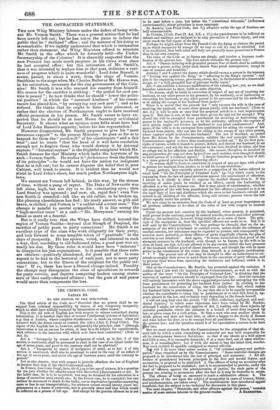THE OSTRACIZED STATESMAN.
Tne new Whig Ministry labours under the defect of being with- out Mr. Vernon Smith. There was a general notion that he had
been merely left out; but he has taken the pains to inform the
public that he " declined" office ; and the manner of his doing. so is remarkable. If we rightly understand that which is insinuation
rather than statement, the Whig Ministers offered to reinstate Mr. Smith in the office which he formerly held—the Under- Secretaryship of the Colonies! It is shrewdly suspected that the new Premier has made much progress in his views even since he last accepted office ; but this intimation of Mr. Smith's, that it was intended to replace him in that post, indicates a vast- ness of progress which is quite wonderful : Lord John Russell, it seems, passed, in about a week, from the stage of Vernon- Smithism to the stage when Mr. Charles Buller or Mr. Hawes was, in his estimation, necessary for the due government of the Colo-
nies! Mr. Smith it was who rescued his country from himself. His reason for the sacrifice is striking : " the period for such ser- vice is passed "; he now thinks that he should a lower the politi-
cal position" in which the " constant kindness " of his consti- tuents has placed him, " by occupying anysuch post " ; and so he refused. He thinks that he ought to have been promoted, or
rather that the electors of Northampton ought to have received official promotion in his person. Mr. Smith seems to have ex- pected that he should be at least Home Secretary or Colonial Secretary. It shows what an opinion some folks must have had of Lord John Russell's sagacity, before his late regeneration ! However disappointed, Mr. Smith proposes to give his "most strenuous support" to the present Ministry : he goes so far as to bespeak for them the" good-will" of his constituents "and a fair
trial"; ; and he trusts "that the head of it will have resolution enough not to forgive those who would destroy it by internal rupture." "Internal rupture" is the frightful complaint which Mr. Smith foresees for that Ministry which lacks the keystone of its arch—Vernon Smith. He wishes it "forbearance from the friends
of its principles "—he would not have the nation too indignant that he is left out; but he cannot disguise the belief that it, poor Cabinet, will break to pieces. It is evident that he would not stand in Lord John's shoes, but much prefers Northampton high- lows.
We cannot see Vernon left behind, in this way, by the stream of time, without a pang of regret. The Duke of Newcastle was left alone, high, but not dry as to his vaticinating eyes ; then Lord Stanley was aground ; and now, oh, rapid flow ! even Ver- non Smith is stranded—left like an old collier, to be broken up. His pleasing cheerfulness has fled ; his ready answer, so glib and
brave, is chilled; Vernon is " a sadder and a wiser man." The change is painfll to mortal sympathies. It is like seeing the " high-mettled racer" in a cart—" Mr. Merryman " earning his bread as mute at a funeral.
But is it really true that the Whigs have drifted beyond the region of Vernon Smiths—beyond that Slough of Despond, the sacrifice of public posts to party connexions? Mr. Smith is an excellent type of the class who work diligently for their party, and look forward to some tangible token of ' gratitude" in the days of prosperity. He has spoken, voted, and laboured in such a way, that, according to old-fashioned rules, a good post was ac-
tually his due. By those rules it would have been ' indecent" to disappoint his just expectations. Is it possible that those rules
are obsolete—positively abandoned, for good and all? Is some regard to be had in the bestowal of each post, not to mere party connexions, but to the fitness of the recipient for the public ser-
vice? If so, there has been a blessed change indeed. Possibly the change may disorganize the class of speculators in rewards for party service, and deprive competing leaders among states- men of that easily-obtained alliance ; but the gain of real power would more than compensate the loss.


























 Previous page
Previous page